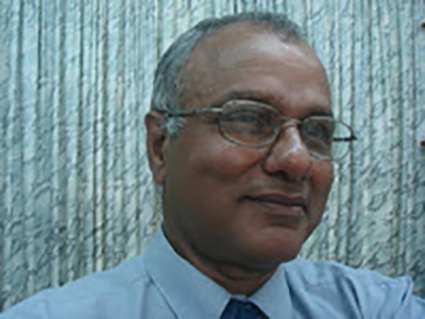
WELLINGTON (Radio NZ International/Dateline Pacific/Pacific Media Watch): One of the few dissident voices in the Fiji news media, Professor Wadan Narsey, has ended his campaign of political dissent in The Fiji Times, Radio NZ International reports.
A noted economist and former parliamentarian, Dr Narsey says the media landscape in Fiji is beset with self-censorship, depriving the public of commentators prepared to question the government.
RNZI's Ben Robinson spoke with Professor Narsey on Dateline Pacific:
WADAN NARSEY: The Fiji Times has been publishing me in the last year after censoring me for several years, but all my articles for The Fiji Times are very strictly vetted by their company lawyers. It's very understandable of course because not too long ago they were fined $400,000 for printing something that had been printed in New Zealand and the editor was given a two-year jail sentence which was suspended. And of course during the Bainimarama military government several Fiji Times publishers were deported for no reason whatsoever. So The Fiji Times has been very cautious but at least they are still pushing the boundaries.
Where the real censorship is occurring is in the television media. FBC (Fiji Broadcasting Corporation) which is headed by the brother of the Attorney-General, has never interviewed me on any economics issue whatsoever since he became the CEO. Fiji TV, which used to once-upon-a-time interview me almost monthly when I was a parliamentarian, when I was a professor of economics at the University [of the South Pacific], well they have totally stopped in the last three years. My journalist friends are very sad about it and they honestly tell you, "we can't risk our jobs".
BEN ROBINSON: Is it just you, or are there other dissenting voices that are no longer being heard?
WN: All dissident voices are being censored. For instance policy debating programmes on television, Close Up on Fiji TV, For the Record on FBC which is a government station, you don't see opposition members of parliament, you don't see critical CEOs of NGOs, you don't see any opposing views at all on these programmes. So there's a silent censorship taking place right throughout the Fiji media that is not visible because there are no censors in the newsrooms, there's nobody physically telling them don't do it, but everybody there they're all self-censoring.
And that is a very invidious thing because at the moment the whole country is giving the appearance of democracy but in actual fact accountability is simply not there. To give you an example there has been a Public Accounts Committee of the Fiji Parliament which has been investigating the Auditor-General's report for 2007 to 2013, which were released only after the 2014 election.... There were some very disturbing comments by the Auditor-General that during three years the ministers' salaries and unknown amounts had been paid to a private accounting company. There were $200,000 or so that was unaccounted for, and the Prime Minister's office and the Minister of Finance were refusing to give them the information.
The Public Accounts Committee, the chairmanship has been changed. Professor Biman Prasad, who is the chairman is probably going to be out of that job soon and all of these questions are going to shoved under the carpet. In any other country if a parliamentarian rorted $20,000 dollars he'd be out on his ear, he'd have to resign. Here in Fiji, hundreds of millions of dollars have gone missing and nobody in the media is able to raise this in any of the public debate programmes. You wouldn't see this happening in Australia or New Zealand.
So the silent-censorship has been going on and it's at great cost to the taxpayers. But the people here in Fiji are sitting on their backsides expecting that the donor countries, Australia, New Zealand, Britain the EU are going to hand them back their freedoms and their democracy. That's not going to happen.
Dr Wadan Narsey's final Fiji Times column on 'silent censorship'
This work is licensed under a Creative Commons Attribution-NonCommercial 3




